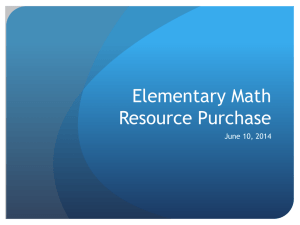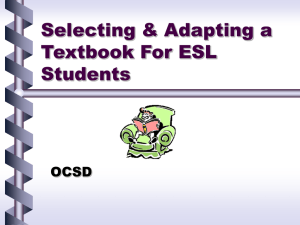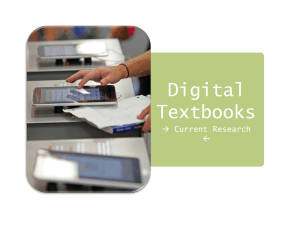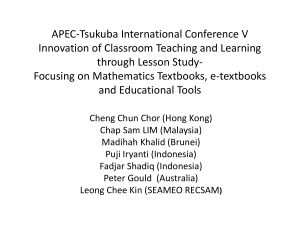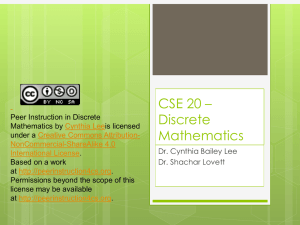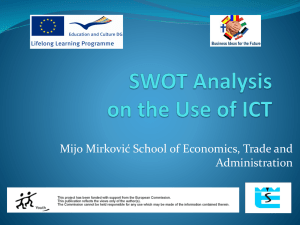Document
advertisement
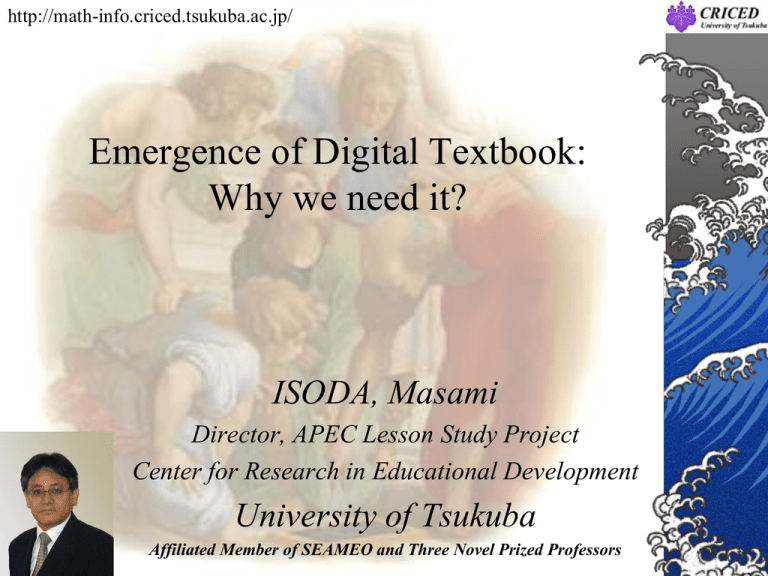
http://math-info.criced.tsukuba.ac.jp/ Emergence of Digital Textbook: Why we need it? ISODA, Masami Director, APEC Lesson Study Project Center for Research in Educational Development University of Tsukuba Affiliated Member of SEAMEO and Three Novel Prized Professors Educational Software: Math. on Projector, Edited b M. Isoda. Awarded by Minister of Education 2005 Awarded Most Beautiful Book of the Year 2009 In the Area of Natural Science What is technology here! Even if the tablet change, human activities have the similarity. Euclid is using the tablet and compass, isn’t it? Why Japanese do not use ICT in Education? Electrical trade Security Transportation Education Do not misunderstand the education. Please do not recognize a school teacher as an ICT trainer only for education. Health care Environment, Energy Offices, labour Public administration Office administration Japan Country placed for 1st place How should we understand ICT? ICT is the base for Knowledge Based Society. Tools for ICT have to revise it for new generations within at most ten years. The cost is usually getting cheaper within a few years. Developed countries already spend huge cost for revision Developing countries do not need to spend it if they select clever selection. Innovation of ICT promotes the devices, which aims to become closer to the interface of human beings. We do not need to teach how to use. ICT is hidden in the normal human activity as a part. Users could not know it because it is a kind of air in the world. Innovation with ICT is possible for users who well know what is the world and how they would like to change. For understanding the world, knowing what if is important. For innovation of the world, imaging what if not is the key. The Status of ICT Education in Asia Now, India developed 35USD tablet PC. Only necessary is electricity and internet line. We should focus on developing the literacy and the basic skills for developing knowledge and thinking critically. What is necessary skill? What is the difference? A b c A b c What is necessary for statistics? Selecting the graph and change the color? Why you spend the time for that instead of teaching statistics??? Look at the histogram of the following two distributions. Meletiou, M., and Lee, C. (2003), AA 16 16 B B 14 14 10 10 10 10 Frequency Frequency 8 8 Frequency Frequency 8 8 6 6 6 6 4 4 4 4 2 2 2 2 0 0 2 2 4 4 6 6 Scores Scores 8 8 10 10 カanswerテゴリ 14 14 12 12 0 0 頻度 16 16 12 12 0 0 Isoda, Orlando(to appear) 0 小 中 高 C1: Select A No reason 3 (3.0) 8 (8.1) 1 (1.5) 11 (17.0) 2 (2.6) 5 (6.4) C2: Select A With Reason 31 24 25 (31.3) (36.9) (32.0) C0.No 0 2 2 4 4 6 6 8 Scores Scores 8 10 10 Which of the two distributions you think has more variability? What is variability? Why do you think this? A variability range 6 A<B 10 Standard deviation 1.796 A<B 2.352 (50%) Interquartile range 3 A<B 4 B C3: Select B With inappropriate reason 16 (16.2) 3 (4.6) 7 (9.0) C4 Select B With Appropriate reason 41 26 39 (41.4) (40.0) (50.0) Meletiou, M., and Lee, C. (2003), Isoda and Orlando(to apper) Consider the following group of histograms and a summary statistics. Each of the variables (1 – 6) corresponds to one of the statistics. Please, match each of the variables with one graph. mean median Standard deviation A 50 50 10 B 50 50 15 C 53 50 10 D 53 50 20 E 47 50 10 F 50 50 5 5.1% of elementary school teachers, 6.2 % of junior high School teachers and 7.7% of high school teachers gave the correct answer. Statistical Literacy Iddo Gal(2004) Statistical literacy refers broadly to two interrelated components, primarily (a) people’s ability to interpret and critically evaluate statistical information, datarelated arguments, or stochastic phenomena, which they may encounter in diverse contexts, and when relevant (b) their ability to discuss or communicate their reactions to such statistical information, such as their understanding of the meaning of the information, their opinions about the implications of this information, or their concerns regarding the acceptability of given conclusions. What is lesson study community? In Japan, products of lesson study are shared through the books and Journals of lesson study. Their PCK is integrated and unified as teachers’ theories for teaching mathematics.. Participating Teachers Theories of Education Lesson study Teacher Children Subject M. Theory of Mathematics Good Practices on Lesson Study: Without Professional Development ホンジュラス・ラパスの事前調査 Without lesson study, Teachers do not learn from their teaching experience. Teacher educators must prepare appropriate experience. Various Challenges in the world lesson study movement. ホンジュラスPROMETAMによる教師の学力改善 How teacher changed by textbooks with guidebooks by Open A. Through the self-evaluation each other in whole school LS The power of School Level Lesson Study Approach for improvement of the quality of whole education through mathematics Figure 5.図1.地域平均からみた大曾根小学校の Ozone Elementary School’s Academic Abilities Compared to the Regional Average 図2. Figure地域平均と大曽根小学校学力比較 6. Ozone Elementary School’s Academic Abilities Compared to the Regional Average 学力 6 Graders 6年生 th Year before Implementation 実施前年 5 Graders 5年生 th 1st Year 1年目 4 Graders 4年生 th 6th Grade Mathematic 2nd Year 2年目 6th Grade Japanese +5 before +0 2nd year 6th Grade 4 Subjects 5th Grade Mathematics 5th Grade Japanese -5 5th Grade 4 Subjects -10 数学的な考え方問題群(100点換算)における平均の差 Difference from average in mathematical thinking problem set (converted to 100 points) Numerical数値は地域平均点とのポイント差 values are point differences from regional average points Through the self-evaluation each other in whole school LS Through understanding the Prob. Sol. Approach: Promised Approach if whole teachers challenge Achieved Problem Posing Not Achieved Achieved できている Independent Solving Instruction 自力解決の指導 Start Time Start Time 開始時 After 1.5 Years After 1.5 Years 30 70 86 1.5年後 0% Achieved できている Comparison and 比較検討の指導 Not Achieved できていない Start Time 16 開始時 20% 40% 60% 80% 40% 100% 60% Achieved できている 80% Not Achieved できていない 91 0% 20% 100% 68 After 1.5 Years 1.5年後 21 14 32 開始時 79 1.5年後 0% Start Time 84 After 1.5 Years 20% Summary まとめの指導 Discussion Not Achieved できていない 40% Figure 7. Improvements in Teacher Instruction as Measured with the Lesson Planning Checklist 9 60% 80% 100% Improvement of Children's Achievements through the 2 years +6. +4. Improvement in Grade A to 学年Aの成長 6th grade +2. +. -2. -4. -6. Year before 実施前年 Implementation 1st 1年目 Year 2年目 2nd Year Improvement in 学年Bの成長 Grade B to 5th grade Improvement in 学年Cの成長 Grade C to 4th grade Difference with Regional Average for Problems in Mathematical Thinking Importance of the Textbook We have the data to show better ways of lesson study. ‘Lesson Study using Fraction Resource Kit developed by Japanese Mathematics textbook in English, shows significant difference when it is compared with the results of Lesson Study activities without specific subject or ordinary lecture style teacher training. We can improve teachers content knowledge if we support their learning with good resource kit.’ By Catherine Lewis (2011) Textbook and teachers are keys. Object and content are keys. Four phases for teaching approach: Problem Posing : what we learned before. Independent Solving: Patients, representation Comparison and Discussion: Knowing and developing ideas Summary and Integration: Value, Leaning how to Textbook for Problem Solving Approach(GakkoTosho) Powered by dbook Please complete the blackboard plan Why we have to compare? Task is given by teacher How much Area? Various Solutions and Comparison <Fill in 2 > <Fill in 4 > Let ‘s use! <Fill in 7> <Fill in 3 > <Fill in 1 > Problem/atic is posed from children, if possible Why we need problematic? <Fill in 5 > <Fill in 6> <Fill in 8> Resume the result of comparison and selection based on generality Are You Sure? from the Academics The countries in East Asia that have Nobel prize winners are only Japan, China and Taiwan. In the case of Fields prize “Nobel prize in mathematics”, only Japan and Vietnam obtained winners in Asia. The quality of academic research in Japan led the world during the 20 th century. 1: Do not let the introduction of digital textbook affect the actual amount of time on experiments and observations 2: Focus on learning scientific facts rather than just watching pictures and images. 3: Do not reduce the time of constructing diagrams and/or calculating done by students themselves with paper and pencils due to the use of digital textbook 4: Afford the opportunities that students take notes to record the classes. 5: Do not concentrate heavily on exercises with filling blanks and choosing the right options. 6: Encourage the exchange of thoughts among students. 7: Do not concentrate much to prepare a beautiful presentation in class sessions and do not discourage to grow the skills of writing 8: Continue improving the individual teaching skills as well as teaching materials. 9: Use ordinary paper based textbooks along with digital textbooks for the time being and adopt paper based textbooks for administering evaluation. Problem Solving A. is: In Japan, 7,000 teachers Collaborative participated on Feb. 18-19. Children centered Constrictive .... Aimed and preferred for: Developing children who learn mathematics for/by themselves. Developing Mathematical Thinking Teaching how to develop mathematics. Teaching values of mathematics As well as developing knowledge and skills Freeware “dbook Pro” for e-textbook The biggest feature of digital textbooks made from “dbook Pro” is that they look the same to the paper based textbooks. Therefore, they can be utilized in the same way of using paper based textbooks, when some digital functions are not required. •Using it as blackboard by highlighting the particular parts of text or writing in blank page, •Reading textbook together in a class while showing the particular parts in the screen, •Showing the contents attached to digital textbooks, such as pictures, movies and computer simulations, •Showing other information by linking to the web contents to digital textbooks, and •Renewing any information attached to digital textbooks when required.
